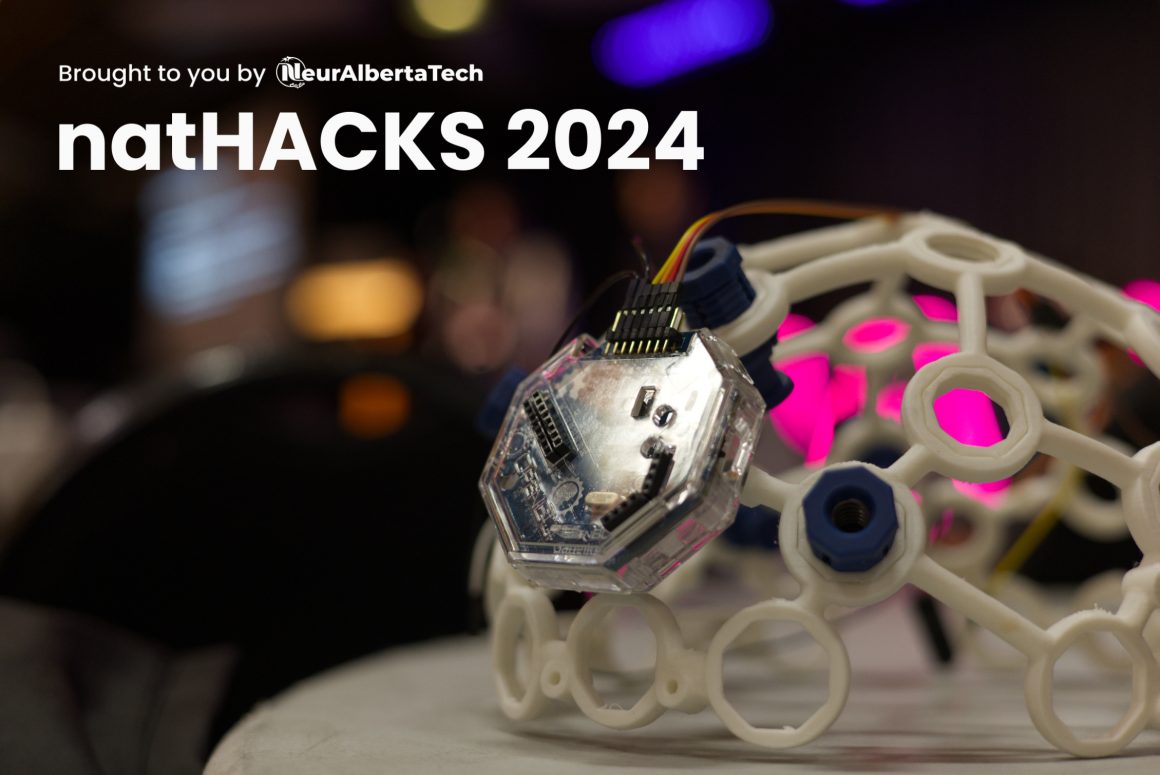
Neurotechnology is at its finest with natHACKS 2024
By Ansharah Shakil, November 22 2024—
NatHACKS, the largest neurotechnology hackathon in Canada, return to Alberta from Nov. 14-17 for its fourth year. The Gauntlet spoke with Mani Vahdatizadeh, Communications Associate for natHACKS, and Yash Mouje, co-president of natHACKS, about this year’s hackathon.
Hosted by NeurAlbertaTech, a non-profit organization with student chapters in charge of local events, natHACKS is an opportunity for professionals and students to work on real-life problems over a weekend consisting of workshops, networking, numerous events and prizes. Prior to the actual weekend is a preparatory lead-up of two weeks of workshops. Everyone is free to participate. This year there was a $20 sign up fee, but individuals had the option to apply for a bursary, and there was an offer of $50 travel costs.
“Neurotech is going to be a big part of our future and … we need people to know what neurotech is and how to use neurotech,” Mouje said, discussing the importance of understanding neurotechnology especially in the current age of AI. “Very likely most people who attend [natHACKS] don’t have any knowledge of neurotech so through workshops they get to play along with things [and] get access to what neurotech is.”
So what is neurotechnology? The simplest way to define the term is to consider it as methods and technologies that learn about what affects our brains and nervous systems. Neurotechnology is a developing, cross-disciplinary field, and its potential is constantly growing. It can be purely research-based, but also rehabilitative and problem-solving.
Mouje explained how it can improve people’s quality of life. One project from last year’s natHACKS used an open VCR headset to predict which word someone wanted to say so they could type without having to use their fingers, helpful in cases such as missing limbs. Other projects have used VR exposure therapy to help with anxiety treatment, or created an app that allows motor-impaired children unable to use instruments to create music with their brains.
This year, natHACKS is collaborating with McGill university students, granting them scholarships so they’re able to fly to Alberta. Vahdatizadeh explained that this new step is one natHACKS is taking to expand their reach nation-wide.
“This year was our first step of doing so to promote not only interdisciplinary collaboration but also inter-institutional collaboration,” he said.
There are two in-person hacking sites in Edmonton and Lethbridge, but there are also virtual hackathons for anyone unable to join in-person. People from Alberta — and across the world, with one participant from Egypt — join, and criteria states that half of the team must be Albertan.
“University of Calgary is also an important part of our neurotech ecosystem in Alberta,” Mouje said. “Unfortunately we couldn’t have a site at UofC [this year] but we did help people at the UofC who are participating travel to participate.”
Vahdatizadeh added that it’s also high-school students in Calgary that are involved in natHACKS.
“The reason why they allowed high school students to participate this year is [because] we want anyone who has a vision and is enthusiastic about solving a problem that they see in their community to have a chance to do something,” he said.
Vahdatizadeh noted that an interesting aspect of natHACKS is that it doesn’t only focus on humans. Last year, first place was given to a project where the hackers designed an ear tag for cattle management.
“[It’s a] breeding ground for people from different fields [to] get their minds together and come up with something,” Vahdatizadeh said. “[That] often doesn’t happen and if it does happen is only a verbal discussion with no tangible products to pursue a solution to a problem. NatHACKS is where you have the conversation and you also do have the products and the hard work.”
One of the ways in which this is encouraged is that the top participants of the hackathon get the chance to work with industry leaders and sponsors.
“That’s a great thing for a scientific community, because then you get to have something tangible and get to show hey, not only do we have the knowledge, we can also make it useful,” Vahdatizadeh said.
More about natHACKS and NeurAlbertaTech as well as their upcoming events can be found here.
